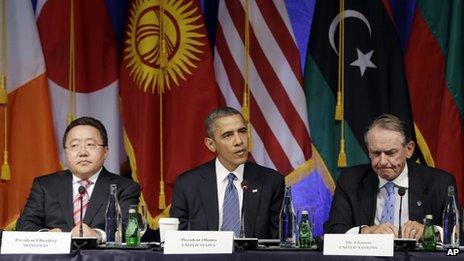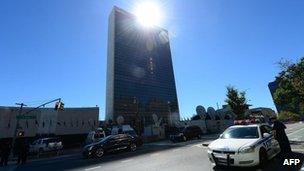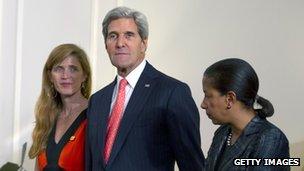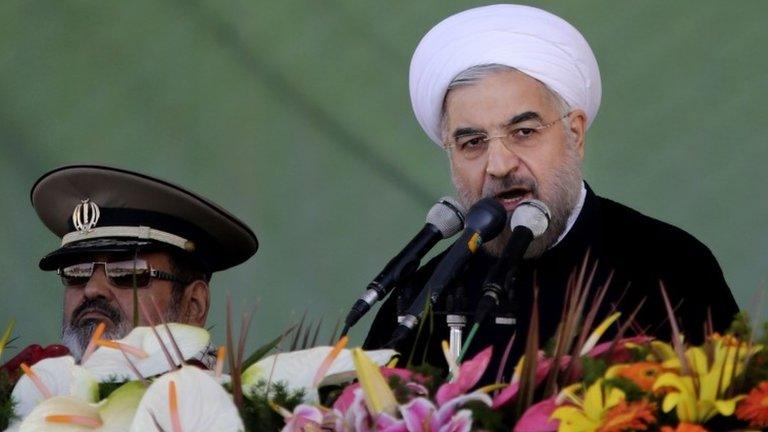Iran, Syria and India-Pakistan: UNGA preview
- Published
- comments

Mr Obama is scheduled to meet international leaders during the 68th United Nations General Assembly in New York
With so many presidents and prime ministers performing at the podium, the UN General Assembly can take on the feel of a diplomatic variety show.
At least 131 leaders are converging on Turtle Bay in New York, site of the UN headquarters.
All of them will get the chance to speak, from the heads of some of the world's richest and largest nations like America and India, to comparative minnows like Cape Verde and Bhutan. The length of your motorcade is often a measure of your power.
For most of the year the focus of UN action - and inaction - is the 15-member Security Council. During the general assembly, all 193 members have a say.
That said, the important diplomacy generally occurs not in the general assembly hall itself but on the sidelines in one-to-one meetings - bilaterals, as diplomats like to call them - or in small gatherings.
This year, admittedly, the stage itself is not so grand. The general assembly hall, a giant auditorium with its familiar green marble speaking dais and golden backdrop, is being renovated.
The gathering is being held in cramped temporary digs, a largely windowless building next door that could easily be mistaken for a desalination plant.
This is the 68th United Nations General Assembly, or UNGA as it is known in this acronym-addicted organisation.
The past month has witnessed a blur of diplomacy, both hurtling and haphazard, from the G20 in St Petersburg to a hotel in Geneva, from Whitehall to Paris.
This week it will continue to unfold in a building designed to be the home of international diplomacy and also in the hotels and country missions nearby.
It could end up being one of the more meaningful and eventful gatherings in decades, given the possibility of significant breakthroughs on Iran and Syria.
Here is a preview of the action:
Iran
Some of the usual star turns are missing, not least the former Iranian President Mahmoud Ahmadinejad, whose fiery speeches aimed at America and Israel regularly sparked mass walk-outs.

The UN headquarters sits along the East River in New York City's Manhattan borough
But his successor, new Iranian President Hassan Rouhani, will receive more attention.
He arrives with a wholly different message: a call for "prudent engagement" with the West and a desire to present the "true face of Iran", words that are a dig at his predecessor.
Mr Rouhani is unquestionably this year's headline act, and his conciliatory words beforehand have heightened speculation that he will come into contact with US President Barack Obama.
A fluke of scheduling leaves them both addressing the general assembly on Tuesday, which could produce a brief encounter - what diplomats call a "brush-by" - at a luncheon hosted by UN Secretary General Ban Ki Moon.
It would be the first time the country's leaders have held direct talks since the Iranian hostage crisis of 1979-81.
There have been near misses before. In the 1990s, there was talk of Mohammad Khatami, another new Iranian president with reformist credentials, meeting then-US president Bill Clinton.
But when the two men came close to bumping into each other, Mr Khatami reportedly took evasive action by hiding in the toilet. Evidently, he was worried at how hardliners back home would view a meeting with the leader of the "Great Satan".
Even if the presidents do not come face-to-face, US Secretary of State John Kerry may well meet the Iranian Foreign Minister Mohammad Javad Zarif at talks on Thursday, also attended by Britain, Germany, Russia and China.
That alone would be an historic milestone. Mr Zarif completed his PhD in America and has distanced himself from the bellicose, Holocaust-denying rhetoric of Mr Ahmadinejad. He sounds like a man with whom the West could do business.
Syria
As the general assembly meets, members of the Security Council are still discussing a resolution enshrining the chemical weapons handover deal negotiated between the US and Russia in Geneva earlier this month.
The authors of that deal, Russian Foreign Minister Sergei Lavrov and Mr Kerry, are both in town, and the Americans have indicated they want to push ahead with getting a binding resolution through the long-deadlocked Security Council.
Differences remain over the wording of that resolution, and their meeting on Tuesday will be the key to resolving them. Diplomats at the UN take orders from their capitals, and this is the week of the year when their bosses are in town.
Sudan

Samantha Power, John Kerry and Obama's national security adviser Susan Rice are at the UNGA
Another question is whether Sudanese President Omar Hassan al-Bashir will follow through on his promise to visit New York.
He is wanted by the International Criminal Court on charges of genocide during the decade-long conflict in Darfur and could potentially be arrested if he steps foot on American soil.
"Such a trip would be deplorable, cynical and hugely inappropriate," said Samantha Power, the US ambassador to the UN.
But America is obligated promptly to grant visas to any world official hoping to attend UN events. Another complicating factor: the US is not party to the International Criminal Court.
India-Pakistan
Any contact between Presidents Obama and Rouhani would undoubtedly hog the headlines, but a possible meeting at a Manhattan hotel between Indian Prime Minister Manmohan Singh and his newly-elected Pakistani counterpart Nawaz Sharif will be eagerly watched in South Asia.
Peace talks between the two countries have been stalled for the past two years, and dialogue could ease recent tensions along the Line of Control that divides Kashmir between the two countries.
Last week, Mr Sharif said he was committed to a "serious sustained and constructive engagement" with India.
- Published23 September 2013
- Published23 September 2013
